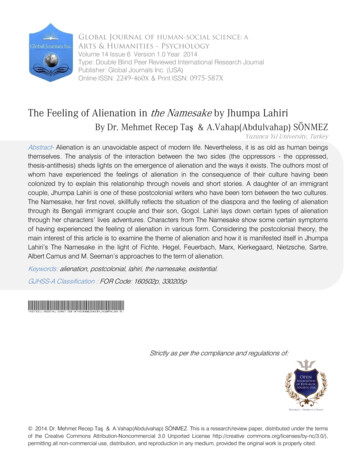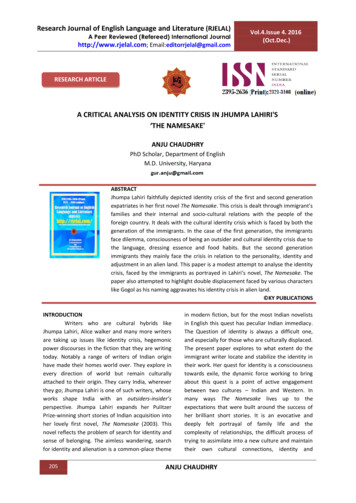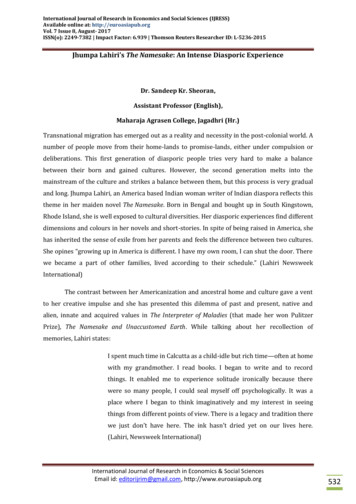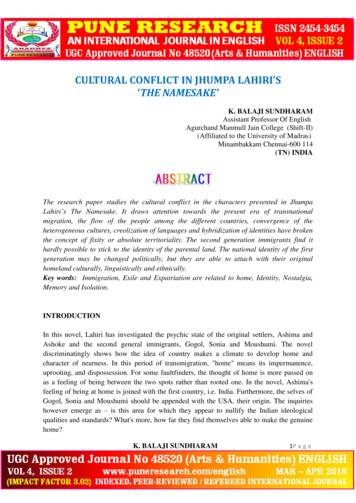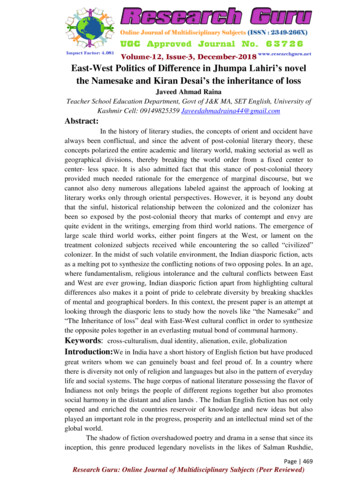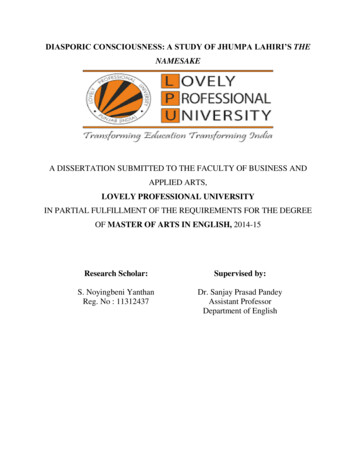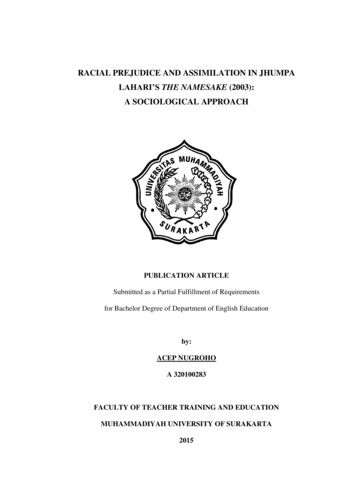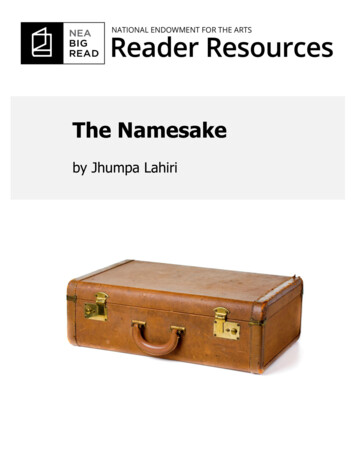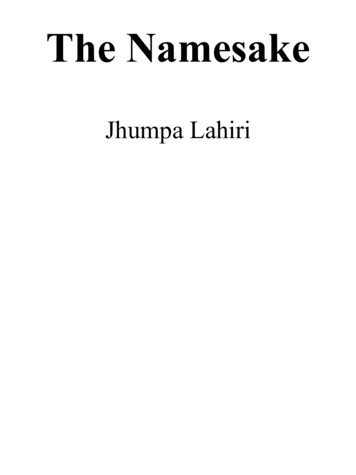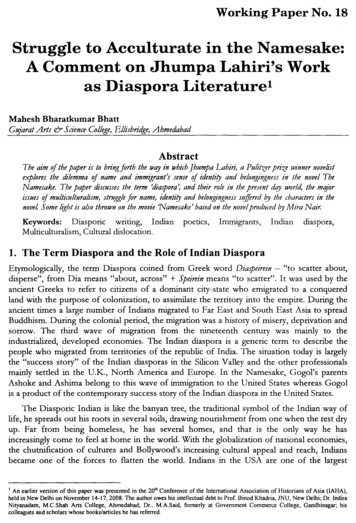![JHUMPA LAHIRI [b. 1967] Interpreter Of Maladies](/img/16/lahiri-interpreter-of-maladies-full-text.jpg)
Transcription
LAtlIRI/Interpreter of MaladiesJHUMPA LAHIRI [b. 1967]Interpreter of MaladiesBorn in London and raised in Rhode Island by her Bengali parents,Jhumpa Lahiri (b. 1967) visited Calcutta often as a child and recognizes the importance of both Indian and American cultures in shapingher perspective on llfe. At the same time, as her fiction shows, she iscritical of the superficial adoption of elements of either culture, andshe readily admits that she feels neither Indian nor American.Lahiri received a B.A. from Barnard College and applied unsuccessfully to several graduate creative writing programs. She took a job as aresearch assistant and in her free time mornings and evenings in theoffice worked on her first book of short fiction. Soon she was acceptedinto Boston University’s creative writing program; finishing there, shetook a Ph.D. in Renaissance Studies and continued to vrite stories. Between 1993 and t997 she won several fiction prizes. By 1997 she decided that she wished to work on fiction full-time, and was admittedinto the Fine Arts Work Center at Provincetown. In seven months shehad hired an agent, sold her first book, and published a story in TheNew Yorker. Her first book, Interpreter of Maladies (1999), a collectionof nine stories, one-thlrd of which had appeared in The New Yorker,won a Pulitzer Prize for fiction in 2000. Her first novel, The Namesake,appeared in 2003.At the tea stall Mr. and Mrs. Das bickered about who should take Tina tothe toilet. Eventually Mrs. Das relented when Mr. Das pointed out thathe had given the girl her bath the night before. In the rearview mirrorMr. Kapasi watched as Mrs. Das emerged slowly from his bulky whiteAmbassador, dragging her shaved, largely bare legs across the back seat.She did not hold the little girl’s hand as they walked to the rest room.They were on their way to see the Sun Temple at Konarak. It was adry, bright Saturday, the mid-July heat tempered by a steady oceanbreeze, ideal weather for sightseeing. Ordinarily Mr. Kapasi would nothave stopped so soon along the way, but less than five minutes after he’dpicked up the family that morning in front of Hotel Sandy Villa, the little"The Interpreter of Maladies" from Inteq mter of Maladies. Copyright 1999 by JhumpaLahiri. Reprinted by permission of Houghton Mifflin Corapany. All rights reserved.12girl had complained. The first thing Mr. Kapasi had noticed when he sawMr. and Mrs. Das, standing with their children under the portico of thehotel, was that they were very young, perhaps not even thirty. In additionto Tina they had two boys, Ronny and Bobby, who appeared very close inage and had teeth covered in a network of flashing silver wires. The family looked Indian bnt dressed as foreigners did, the children in stiff,brightly colored clothing and caps with translucent visors. Mr. Kapasiwas accustomed to foreign tourists; he was assigned to them regularlybecause he could speak English. Yesterday he had driven an elderlycouple from Scotland, both with spotted faces and fluffy white hair sothin it exposed their sunburnt scalps. In comparison, the tanned, youthful faces of Mr. and Mrs. Das were all the more striking. When he’d in troduced himself, Mr. Kapasi had pressed his palms together in greeting,but Mr. Das squeezed hands like an American so that Mr. Kapasi felt it inhis elbow. Mrs. Das, lbr her part, had flexed one side of her mouth, smiling dutif ally at Mr. Kapasi, without displaying any interest in him.As they waited atthe tea stall, Ronny, who looked like the older of thetwo boys, clambered suddenly out of the back seat, intrigued by a goattied to a stake in the ground."Don’t touch it," Mr. Das said. He glanced up from his paperback tourbook, which said "mD " in yellow letters and looked as if it had beenpublished abroad. His voice, somehow tentative and a little shrill,sounded as though it had not yet settled into maturity."I want to give it a piece of gum," the boy called back as he trottedahead.Mr. Das stepped out of the car and stretched his legs by squattingbriefly to the ground. A clean-shaven man, he looked exactly like a magnified version of Ronny. He had a sapphire blue visor, and was dressed inshorts, sneakers, and a T-shirt. The camera slung around his neck, withan impressive telephoto lens and numerous buttons and tam’kings, wasthe only complicated thing he wore. He frowned, watching as Ronnyrushed toward the goat, but appeared to have no intention of intervening. "Bobby, make sure that your brother doesn’t do anything stupid.""I don’t feel’ like it," Bobby said, not moving. He was sitting in thefront seat beside Mr. Kapasi, studying a picture of the elephant godtaped to the glove compartment."No need to worry," Mr. Kapasi said. "They are quite tame." Mr.Kapasi was forty-six years old, with receding hair that had gone completely silver, but his butterscotch complexion and his unlined brow,which he treated in spare moments to dabs of lotus-oil balm, made iteasy to imagine what he must have looked like at an earlier age. He woregray trousers and a matching jacket-style shirt, tapered at the waist, withshort sleeves and a large pointed collm; made of a thin but durable syn13
LAmRi/Interpreter of Maladiesthetic material. He had specified both the cut and the fabric to histailor--it was his preferred uniform for giving tours because it did notget crushed during his long hours behind the wheel. Through the 7 vindshield he watched as Ronny circled around the goat, touched it quicklyon its side, then trotted back to the car."You left India as a child?" Mr. Kapasi asked when Mr. Das had settledonce again into the passenger seat."Oh, Mina and I were both born in America," Mr. Das announced withan air of sudden confidence. "Born and raised. Our parents live herenow, in Assansol. They retired. We visit them every couple years.turned to watch as the little girt ran toward the car, the wide purple bowsof her sundress flopping on her narrow brown shoulders. She was holding to her chest a doll with yellow hair that looked as if it had beenchopped, as a punitive measure, with a pair of dull scissors. "This isTina’s first trip to India, isn’t it, Tina?""I don’t have to go to the bathroom anymore," Tina announced."Where’s Mina?" Mr. Das asked.Mr. Kapasi found it strange that Mr. Das should refer to his wifeby her first name when speaking to the little girl. Tina pointed to whereMrs. Das was purchasing something from one of the shiftless men whoworked at the tea stall. Mr. Kapasi heard one of the shirttess men sing aphrase from a popular Hindi love song as Mrs, Das walked back to thecar, but she did not appear to understand the words of the song, for shedid not express irritation, or embarrassment, or react in any other wayto the man’s declarations.He observed her. She wore a red-and-white-checkered skirt thatstopped above her knees, slip-on shoes with a square wooden heel, and aclose-fitting blouse styled like a man’s undershirt. The blouse was decorated at chest-level with a calico appliqu in the shape of a strawberry.She was a short woman, with small hands like paws, her frosty pink fingernails painted to match her lips, and was slightly plump in her figure.Her hair, shorn only a little longer than her husband’s, was parted far toone side. She was wearing large dark brown sunglasses with a pinkishtint to them, and carried a big straw bag, almost as big as her torso,shaped like a bowl, with a water bottle poking out of it. She walkedslowly, carrying some pnffed rice tossed with peannts and chili peppersin a large packet made from newspapers. Mr. Kapasi turned to Mr. Das."!Where in America do you live?""New Brunswick, New Jets y."Exactly. I teach middle school there.""What subject?""Science. In fact, every year I take nay students on a trip to the14LAtlIRI / Interpreter of MaladiesMuseum of Natural History in New York City. In a way we have a lot incommon, you could say, you and I. How long have you been a tourguide, Mr. Kapasi?""Five years."Mrs. Das reached the car. "How long’s the trip?" she asked, shuttingthe doon"About two and a half hours," Mr. Kapasi replied.At this Mrs. Das gave an impatient sigh, as if she had been travelingher whole life without pause. She fanned herself with a folded Bombayfilm magazine written in English."I thought that the Sun Temple is only eighteen miles north of Puff,"Mr. Das said, tapping on the tour book."The roads to Konarak are poor. Actually it is a distance of fifty-twomiles," Mr. Kapasi explained.Mr. Das nodded, readjusting the camera strap where it had begun tochafe the back of his neck.Before startirlg ghe ignition, Mr. Kapasl reached back to make sure thecrankfike locks on t inside of each of the back doors were secured. Assoon as the car began to move the little girl began to play with the lockon her side, clicking it with some effort forward and backward, but Mrs.Das said nothing to stop her. She sat a bit slonched at one end of theback seat, not offering her puffed rice to anyone. Ronny and Tina sat oneither side of her, both snapping bright green gum,"Look," Bobby said as the car began to gather speed. He pointed withhis finger to the tall trees that lined the road. "Look.""Monkeys!" Ronny shrieked. "Wow]"They were seated in groups along the branches, with shining blackfaces, silver bodies, horizontal eyebrows, and crested heads. Their longgray tails dangled llke a series of topes among the leaves. A fewscratched themselves with black leathery hands, or swung their feet,staring as the car passed."We call them the hanuman," Mr. Kapasi said. "They are quite common in the area."As soon as h spoke, one of the monkeys leaped into the middle of theroad, causing Mr. Kapasi to brake suddenly. Another bounced onto thehood of the car, then sprang away. Mr. Kapasi beeped his horn. The children began to get excited, sucking in their breath and covering theirfaces partly with their hands. They had never seen monkeys outside of azoQ, Mr. Das explained. He asked Mn Kapasi to stop the car so that hecould take a picture.While Mr. Das adjusted his telephoto lens, Mrs. Das reached into herstraw bag and pulled out a bottle of colorless nail polish, which she proceeded to stroke on the tip of her index finger.15
LAHIRI / Interpreter of MaladiesLAHIRl/interpreter of MaladiesThe little girt stuck out a hand. "Mine too. Mommy, do mine too.""Leave me alone," Mrs. Das said, blowing on her nail and turning herbody slightly. "You’re making me mess up."The little girl occupied herself by buttoning and unbuttoning apinafore on the doll’s plastic body."All set," Mr. Das said, replacing the lens cap.The car rattled considerably as it raced along the dusty road, causingthem all to pop up fi’om their seats every now and then, but Mrs. Dascontinued to polish her nails. Mr. Kapasi eased up on the accelerator,hoping to produce a smoother ride. When he reached for the gearshiftthe boy in front accommodated him by swinging his hairless knees outof the way. Mr. Kapasi noted that this boy was slightly paler than theother children. "Daddy, why is the driver sitting on the wrong side in thiscar, too?" the boy asked."They all do that here, dummy," Ronny said."Don’t call your brother a dummy," Mr. Das said. He turned to Mr.Kapasi. "In America, you know., it confuses them.""Oh yes, I am well aware," Mr. Kapasi said. As delicately as he conld,he shifted gears again, accelerating as they approached a hill in the road."I see it on Dallas, the steering wheels are on the left-hand side.""What’s Dallas?" Tina asked, banging her now naked dolt on the seatbehind Mr. Kapasi."It went off the air," Mr. Das explained. "It’s a television show."They were all like siblings, Mr. Kapasi thought as they passed a row ofdate trees. Mr. and Mrs. Das behaved like an older brother and sister, notparents. It seemed that they were in charge of the children only for theday; it was hard to believe they were regularly responsible for anythingother than themselves. Mr. Das tapped on his lens cap, and his tourbook, dragging his thumbnail occasionally across the pages so that theymade a scraping sound. Mrs. Das continued to polish her nails. She hadstill not removed her sunglasses. Every now and then Tina renewed herplea that she wanted her nails done, too, and so at one point Mrs. Dasflicked a drop of polish on the little girl’s finger before depositing thebottle back inside her straw bag."Isn’t this an air-conditioned car?" she asked, still blowing on herhand. The window on Tina’s side was broken and could not be rolleddown."Quit complaining," Mr. Das said. "It isn’t so hot.""I told you to get a car with air-condltioning," Mrs. Das continued."Why do you do this, Raj, just to save a few stupid rupees. What are yousaving us, fifty cents?"Their accents sounded just like the ones Mr. Kapasi heard on American television programs, though not like the ones on Dallas."Doesn’t it get tiresome, Mr. Kapasi, showing people the same thingevery day?" Mr. Das asked, rolling down his own window all the way."Hey, do you mind stopping the car. I just want to get a shot ol2 this guy."Mr. Kapasi pulled over to the side of the road as Mr. Das took a pictureof a barefoot man, his head wrapped in a dirly turban, seated on top of acart of grain sacks pulled by a pair of bullocks. Both the man and thebullocks were emaciated. In the back seat Mrs. Das gazed out anotherwindow, at the sky, where nearly transparent clouds passed quickly infront of one another."I look forward to it, actually," Mr. Kapasi said as they continued ontheir way. "The Sun Temple is one of my favorite places. In that way it isa reward for me. I give tours on Fridays and Saturdays only. I haveanother job during the week.""Oh? Where?" Mr. Das asked."I work in a doctor’s office.""You’re a doctor?""I am not a doctor. I work with one. As an interpreter.""What does a doc br need an interpreter for?""He has a number of Gujarati patients. My father was Gujarati, butmany people do not speak Gujarati in this area, including the doctor.And so the doctor asked me to work in his office, interpreting what thepatients say.""Interesting. I’ve never heard of anything like that," Mr. Das said.Mr. Kapasi shrugged. "It is a job like any other.""But so romantic," Mrs. Das said dreamily, breaking her extendedsilence. She lifted her pinkish brown sunglasses and arranged them ontop of her head like a tiara. For the first time, her eyes met Mr. Kapasi’sin the rearview min’or: pale, a bit small, their gaze fixed but drowsy.Mr. Das craned to took at her. "What’s so romantic about it?""I don’t know. Something." She shrugged, knitting her brows togetherfor an instant. "Would you like a piece of gum, Mr. Kapasi?" she askedbrightb: She reached into her straw bag and handed him a small squarewrapped in green-and-white-striped paper. As soon as Mr. Kapasi put thegum in his m uth a thick sweet liquid burst onto his tongue."Tell us more about your job, Mr. Kapasi," Mrs. Das said."What would you llke to know, madame?""I don’t know," she shrugged, munching on some puffed rice and licking the mustard oil from the corners of her mouth. "Tell us a typical situation." She settled back in her seat, her head tilted in a patch of sun, andclosed her eyes. "I want to picture what happens.""Very well. The other day a man came in with a pain in his throat.""Did he smoke cigarettes?""No. It was very curious. He complaiued that he felt as if there were1617
LAHIRI/Interpreter of MaladiesLAIIIRI/Interpreter of Maladieslong pieces of straw stuck in his throat. When I told the doctor he wasable to prescribe the proper medication.""That’s so neat.""Yes," Mr. Kapasi agreed after some hesitation."So these patients are totally dependent on you," Mrs. Das said. Shespoke slowly, as if she were thinking aloud. "In a way, more dependenton you than the doctor.""How do you mean? How could it be?""Well, for example, you could tell the doctor that the pain felt like aburning, not straw. The patient would never know what you had told thedoctor, and the doctor wouldn’t know that you had told the wrong thing.It’s a big responsibility.""Yes, a big responsibility you have there, Mn Kapasi," Mr. Das agreed.Mn Kapasi had never thought of his job in such complimentary terms.To him it was a thankless occupation. He found nothing noble in interpreting people’s maladies, assiduously translating the symptoms of somany swollen bones, countless cramps of bellies and bowels, spots onpeople’s palms that changed color, shape, or size. The doctor, nearly halfhis age, had an affinity for bell-bottom trousers and made humorlessjokes about the Congress party. Together they worked in a stale littleinfirmary where Mr. Kapasi’s smartly tailored clothes clung to him in theheat, in spite of the blackened blades of a ceiling fan churning over theirheads.The ,job was a sign of his failings. In his youth he’d been a devotedscholar of foreign languages, the owner of an impressive collection ofdictionaries. He had dreamed of being an interpreter for diplomats anddignitaries, resolving conflicts between people and nations, settling disputes of which he alone could understand both sides. He was a selfeducated man. In a series of notebooks, in the evenings before his parentssettled his marriage, he had listed the common etynmlogies of words,and at one point in his life he was confident that he could converse, ifgiven the opportunity, in English, French, Russian, Portuguese, and Italian, not to mention Hindi, Bengali, Orissi, and GujaratL Now only ahandful of European phrases remained in his memory, scattered wordsfor things like saucers and chairs. English was the only non-Indian languag’e he spoke fluently anymore. Mr, Kapasi knew it was not a remarkable talent. Sometimes he feared that his children knew better Englishthan he did, just from watching television. Still, it came in handy for thetours.He had taken the ,job as an interpreter after his first son, at the age o[seven, contracted typhoid--that was how he had first made the acqualntance of the doctor. At the time Mr. Kapasi had been teaching English ina grammar school, and he bartered his skills as an interpreter to pay theincreasingly exorbitant medical bills. In the end the boy had died oneevening in his mother’s arms, his limbs burning with fever, but thenthere was the funeral to pay for, and the other children who were bornsoon enough, and the newer, bigger house, and the good schools andtutors, and the fine shoes and the television, and the countless otherways he tried to console his wife and to keep her from crying in hersleep, and so when the doctor offered to pay him twice as much as heearned at the grammar school, he accepted. Mr. Kapasi knew that hiswife had little regard for his career as an interpreten He knew itreminded her of the son she’d lost, and that she resented the other liveshe helped, in his own small way, to save. If ever she referred to his position, she used the phrase "doctor’s assistant," as if the process of interpretation were equal to taking someone’s temperature, or changing abedpan. She never asked him about the patients who came to the doctor’s office, or said that his job was a big responsibility.For this reason it flattered Mr. Kapasi that Mrs. Das was so intriguedby his job. Unlike.t’ds wife, she had reminded him of its intellectual chablenges. She had algaused the word "romantic." She did not behave in aromantic vay toward her husband, and yet she had used the word todescribe him. He wondered if Mn and Mrs. Das were a bad match, justas he and his wife were. Perhaps theT 5 too, had little in common apartfrom three children and a decade of their lives. The signs he recognizedfrom his own marriage were there- the bickering, the indifference, theprotracted silences. Her sudden interest in him, an interest she did notexpress in either her husband or her children, was mildly intoxicating.When Mr. Kapasi thought once again about how she had said "romantic," the feeling of intoxication grew.He began to check his reflection in the rearview mirror as he drove,feeling grateful that he had chosen the gray suit that morning and notthe brown one, which tended to sag a little in the knees. From time totime he glanced through the mirror at Mrs. Das. In addition to glancingat her face he glanced at the strawberry between her breasts, and thegolden brown hollow in her throat. He decided to tell Mrs. Das aboutanother patient, and another: the young woman who had complained ofa sensation of raindrops in her spine, the gentleman whose birthmarkhad begun to sprout hairs. Mrs. Das listened attentively, stroking herhair with a small plastic brush that resembled an oval bed of nails, asking more questions, for yet another example. The children were quiet,in.tent on spotting more monkeys in the trees, and Mr. Das was absorbedby his tour book, so it seemed like a private conversation between Mr.Kapasi and Mrs. Das. In this manner the next half hour passed, andwhen they stopped for lunch at a roadside restaurant that sold frittersand omelette sandwiches, usually something Mr. Kapasi looked forward1819
LAHIRI ] Interpreter of Maladiesto on his tours so that he could sit in peace and enjoy some hot tea, hewas disappointed. As the Das family settled together under a magentaumbrella fringed vith white and orange tassels, and placed their orderswith one of the waiters who marched about in tricornered caps, Mr.Kapasi reluctantly headed toward a neighboring table,"Mr. Kapasi, wait. There’s room here," Mrs. Das called out. She gathered Tina onto her lap, insisting that he accompany them. And so,together, they had bottled mango juice and sandwiches and plates ofonions and potatoes deep:fried in graham-flour batter. After finishingtwo omelette sandwiches Mr. Das took more pictures of the group asthey ate."How much longer?" he asked Mn Kapasi as he paused to load a newroll of film in the camera."About half an hour more."By now the children had gotten up from the table to look at moremonkeys perched in a nearby tree, so there was a considerable spacebetween Mrs. Das and Mr. Kapasi. Mr. Das placed the camera to his faceand squeezed one eye shut, his tongue exposed at one comer of hismouth. "This looks funny. Mina, you need to lean in closer to Mr.Kapasi."She did. He could smell a scent on her skin, ltkea mixture of whiskeyand rosewater. He worried suddenly that she could smell his perspiration, which he knew had collected beneath the synthetic material of hisshirt. He polished off his mango juice in one gulp and smoothed his silver hair with his hands. A bit of the juice dripped onto his chin. He wondered if Mrs. Das had noticed.She had not. "What’s your address, Mr. Kapasi?" she inquired, fishingfor something inside her straw bag."You would llke my address?""So we can send you copies," she said. "Of the pictures." She handedhim a scrap of paper which she had hastily ripped from a page of herfilm magazine. The blank portion was limited, for the narrow strip wascrowded by lines of text and a tiny picture of a hero and heroine embracing under a eucalyptus tree.The paper curled as Mr. Kapasi wrote his address in clear, careful letters. She would write to him, asking about his days interpreting at thedoctor’s office, and he would respond eloquently, choosing only the mostentertaining an. . ecd o. te s, ones that would make her laugh out loud as sheread them in her house in New Jersey. In time she would reveal the disappointment of her marriage, and he his. In this way their friendshipwould grow, and flourish. He would possess a picture of the two of them,eating fried onions under a magenta umbrella, which he would keep, hedecided, safely tucked between the pages of his Russian grammar. As his20LAHIRI [ Interpreter of Maladiesmind raced, Mr. Kapasi experienced a mild and pleasant shock: It Wassimilar to a feeling he used to experience long ago when, after months oftranslating with the aid of a dictionary; he would finally read a passagefrom a French novel, or an Italian sonnet, and understand the words,one after another, anencumbered by his own efforts. In those momentsMr. Kapasi used to believe that all was right with the world, that allstt ggles were rewarded, that all of l’fe s mistakes made sense in the end.The promise that he would hear from Mrs. Das now filled him with thesame belief.When he finished writing his address Mr. Kapasi handed her thepaper, but as soon as he did so he worried that he had either misspelledhis name, or accidentally reversed the numbers of his postal code. Hedreaded the possibility of a lost letter, the photograph never reachinghim, hovering somewhere in Orissa, close but ultimately unattainable.He thought of asking for the slip of paper again, just to make sure he hadWritten his address accurately, but Mrs. Das had already dropped it intothe jumble of her .bag.They reached Konarak at two-thirty. The temple, made of sandstone,was a massive pyramid-like structure in the shape of a chariot. It wasdedicated to the great master of life, the sun, which struck three sides ofthe edifice as it made its journey each day across the sky: Twenty-fourgiant wheels were carved on the north and south sides of the plinth. Thewhole thing was drawn hy a team of seven horses, speeding as if throughthe heavens. As they approached, Mr. Kapasi explained that the templehad been built between h.D. 1243 and 1255, with the efforts of twelvehundred artisans, by the great ruler of the Ganga dynasty, KingNarasimhadeva the First, to commemorate his victory against the Muslim army."It says the temple occupies about a hundred and seventy acres ofland," Mr. Das said, reading from his book."It’s like a desert," Ronny said, his eyes wandering across the sand thatstretched on all sides beyond the temple."The Chan rabhaga River once flowed one mile north of here. It is dlNnow," Mn Kapasi said, turning off the engine.They got out and walked toward the temple, posing first for picturesby the pair of lions that flanked the steps. Me Kapasi led them next toone of the wheels of the chariot, higher than any human being, nine feetin diameter."The wheels are supposed to symbolize the wheel of life,’" Mr, Dasread. "’They depict the cycle of creation, preservation, and achievementof reati.zation.’ Cool." He turned the page of his book. "’Each wheel isdivided into eight thick and thin spokes, dividing the day into eight eqnal21
LAHIRI/Interpreter of Maladiesparts. The rims are carved with designs of birds and animals, whereasthe medallions in the spokes are carved with women in luxurious poses,largely erotic in nature.’"What he referred to were the countless friezes of entwined naked bodies, making love in various positions, women clinging to the necks ofmen, their knees wrapped eternally around their lovers’ thighs. In addition to these were assorted scenes from daily life, of hunting and trading, of deer being killed with bows and arrows and marching warriorsholding swords in their hands.It was no longer possible to enter the temple, for it had filled withrabble years ago, but they admired the exterior; as did all the touristsMr. ’Kapasi brought there, slowly strolling along each of its sides. Mr.Das trailed behind, taking pictures. The children ran ahead, pointing tofigures of naked people, intrigued in particular by the Nagamithunas,the half-human, hatf-serpentlne couples who were said, Mr. Kapasi toldthbm, to live in the deepest waters of the sea. Mr. Kapasi was pleasedthat they liked the temple, pleased especially that it appealed to Mrs.Das. She stopped every three or four paces, staring silently at the carvedlovers, and the processions of elephants, and the topless female musicians beating on two-sided drums.Though Mr. Kapasi had been to the temple countless times, itoccurred to him, as he, too, gazed at the topless women, that he hadnever seen his own wife fully naked. Even when they had made love shekept the panels of her blouse hooked together, the string of her petticoatknotted around her waist. He had never admired the backs of his wife’slegs the way he now admired those of Mrs. Das, walking as if for his benefit alone. He had, of course, seen plenty of bare fimbs before, belongingto the American and European ladies who took his tours. But Mrs. Daswas different. Unlike the other women, who had an interest only in thetemple, and kept their noses buried in a guidebook, or their eyes behindthe lens of a camera, Mrs. Das had taken an interest in him.Mr. Kapasi was anxious to be alone with her, to continue their privateconversation, yet he felt nervous to walk at her side. She was lost behindher sunglasses, ignoring her husband’s requests that she pose foranother picture, walking past her children as if they vere strangers.Worridd that he might disturb her, Mr. Kapasi walked ahead, to admire,as he always did, the three life-sized bronze avatars of Surya, the sungod, each emerging from its own niche on the temple facade to greet thesun at dawn, noon, and evening. They wore elaborate headdresses, theirlanguid, elongated eyes closed, their bare chests draped with carvedchains and amulets. Hibiscus petals, offerings from previous visitors,were strewn at their gray-green feet. The last statue, on the northern wallof the temple, was Mr. Kapasi’s favorite. This Surya had a tircd expres22LAHIRI/Interpreter of Maladiession, weary after a hard day of work, sitting astride a horse with foldedlegs. Even his horse’s eyes were drow.sy. Around his body were smallersculptures of women in pairs, their hips thrust to one side."Who’s that?" Mrs. Das asked. He was startled to see that she wasstanding beside him."He is the Astachala-Surya," Mr. Kapasi said. "The setting sun.""So in a couple of hours the sun will set right here?" She slipped a footout of one of her squ re-heeled shoes, rubbed her toes on the back of herother leg."That is correct."She raised her sunglasses for a moment, then put them back on again."Neat."Mr. Kapasi was not certain
JHUMPA LAHIRI [b. 1967] Interpreter of Maladies Born in London and raised in Rhode Island by her Bengali parents, Jhumpa Lahiri (b. 1967) visited Calcutta often as a child and recog-nizes the importance of both Indian and American cultures in shaping her perspectiv
